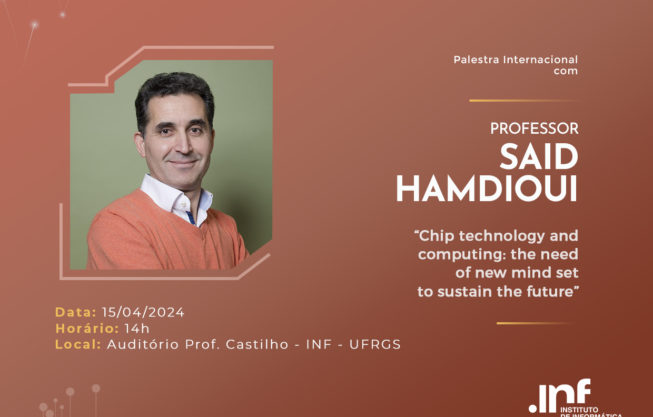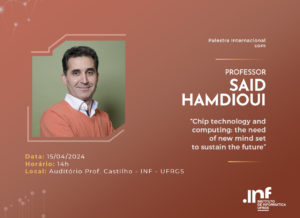
Publicado em: 08/04/2024
Palestra Internacional com Said Hamdioui
Professor Said Hamdioui, da Delft University of Technology de Netherlands, estará visitando o Instituto de Informática da UFRGS no dia 15/04.

O Professor Said Hamdioui, da Delft University of Technology, de Netherlands, estará visitando o Instituto de Informática da UFRGS no dia 15/04/2024.
Ele apresentará a palestra “Chip technology and computing: the need of new mind set to sustain the future” neste dia às 14h no Auditório Prof. Castilho.
Title: Chip technology and computing: the need of new mind set to sustain the future
Abstract
No one can deny the fact that we rely heavily on electronic systems in our daily life. It is almost impossible to imagine a day without your smart phone, computers, TV or even our coffee-machines. Without electronics and internet, business/work couldn’t continue any more, the quality of education would degenerate, and the life quality probably turn back to the 18th century. However, this comes at a non negligible price, and this price further increases with emerging applications such as AI (Artificial Intelligence). For instance, the energy forecast suggests that the electricity demand for ICT will reach over 20% of the global electricity demand by 2030. Energy spending on data centres, smart phones, computers, networks are at the heart of this consumption. Hence, designing and even using these systems in an energy efficient manner is of critical importance.
This talk discusses today’s chip technology and computer hardware/architectures (which enable the design of ICT systems), and highlights their limitations making them unsuitable to enable energy efficient solutions needed; not only to minimize the ICT’s electricity consumption and ensure the sustainability, but also to enable many emerging energy-constrained applications such as edge-AI. The talk will cover both the device as well as the architecture aspects. Thereafter, the talk will cover some future directions for energy efficient computing, while focusing on Computation-In-Memory (CIM) architecture using both memristor devices as well as traditional
technologies such as SRAMs, and inspired with the brain. The huge potential of CIM (in realizing over 100X improvement in terms of energy efficiency) will be illustrated based on some real case
studies, supported by data measurement of chip prototypes. Aspects related to design, test and reliability of such brain-inspired CIM architectures will be discussed. Future challenges in chip technology and computer hardware/ architectures will be highlighted.
About the speaker
Said Hamdioui (http://www.ce.ewi.tudelft.nl/hamdioui) is currently head of Computer Engineering Laboratory at Delft University of Technology, the Netherlands. He is also co-founder and CEO of
Cognitive-IC, a start-up focusing on hardware dependability solutions. Hamdioui received the MSEE and PhD degrees (both with honors) from TUDelft. Prior to joining TUDelft as a professor, Hamdioui worked for Intel Corporation (Califorina, USA), Philips Semiconductors R&D (Crolles, France) and Philips/ NXP Semiconductors (Nijmegen, The Netherlands).
Hamdioui owns two patents, has published one book and contributed to other two, and had co-authored over 250 conference and journal papers. He has consulted for many worldwide semiconductor companies such as Intel, Atmel, Renesas, etc. He delivered dozens of keynote speeches, distinguished lectures, and invited presentations and tutorial at major international forums/conferences/schools and at leading semiconductor companies. Hamdioui (has) served as Associate Editor of many journals such as IEEE Transactions on VLSI Systems, Microelectronic Reliability, ACM Journal on Emerging Technologies in Computing Systems, IEEE Design & Test, etc.
Hamdioui is the recipient of many international/national awards. E.g., he is the recipient of European Design Automation Association (EDAA) Outstanding Dissertation Award in 2003, the European Commission Components and Systems Innovation Award for most innovative H2020
project at European Forum for Electronic Components and Systems in 2020, HiPEAC Technology Transfer Award in 2015 and 2022, etc. In addition, he received many Best Paper Awards and nominations at many leading international conferences (e.g., , IEEE International
Conference on Computer Design (ICCD), Design Automation and Test in Europe (DATE), International test Conference (ITC), IEEE Computer Society Annual Symposium on VLSI (ISVLSI), IEEE European Test Symposium (ETS), etc.). Moreover, he was appointed as an IEEE Circuits
and Systems Society (CASS) Distinguished Lecturer for 2021-2022. He is a member of AENEAS Scientific Committee Council (AENEAS =Association for European NanoElectronics Activities).

